Blog
April 24, 2025
Year over year, PHP security is reported as a leading concern for developer teams. That worry stands to reason, with new threats and vulnerabilities discovered daily. The first step to safeguarding your critical PHP applications and sensitive customer data is to understand the current landscape.
In this blog post, I delve into our findings from the 2025 PHP Landscape Report with a focus on PHP security and compliance trends. I break down how confident PHP professionals are in their security, discuss a few tactical trends, and explore ongoing changes surrounding compliance requirements and regulations.
About the 2025 PHP Landscape Report
The annual PHP Landscape Report is built on responses to an anonymous survey of self-identified PHP users and administrators from around the world and across industries. This report seeks to understand and track ongoing changes in the PHP ecosystem to provide actionable insights for PHP teams in the coming year. You can access your free copy of our full findings here.
We previously examined PHP usage and deployment trends in 2025. Now, we turn our attention to security and compliance patterns. But before we jump into the data, we wanted to understand the top development priorities for PHP teams, which is always one of the key areas we look at in our report. We asked participants to rank their priorities on a scale of one to five, with one indicating the lowest level of priority and five indicating the highest.
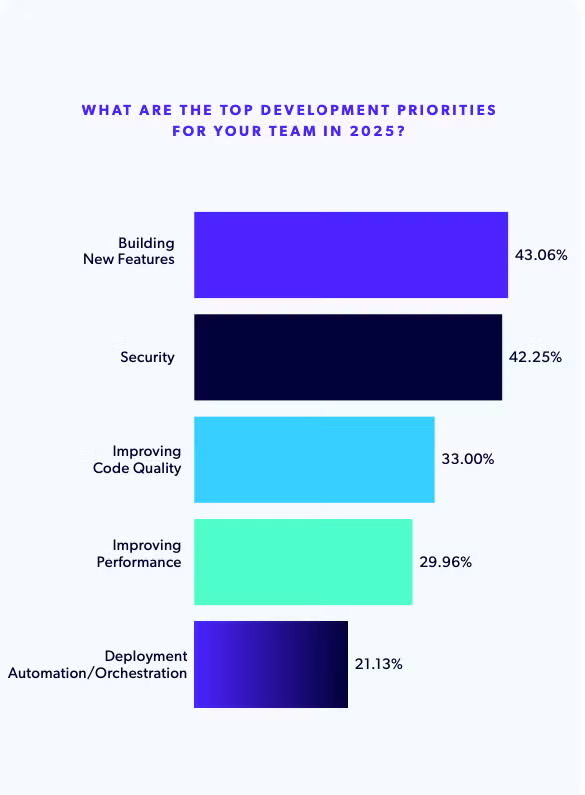
43.06% answered that their biggest priority was Building New Features, followed very closely by Security (42.25%). The percentage of participants who reported Security as a top priority rose approximately 3% compared to our 2024 findings. This underlines a key fact: security is a top concern for PHP developers in 2025.
PHP Security Trends
We began this section by asking participants to share their confidence level regarding the security of their PHP applications. 16.67% selected "Extremely Confident," 50.67% selected "Very Confident," 27.03% selected "Somewhat Confident," 4.05% selected "Not So Confident," and 1.58% selected "Not At All Confident."
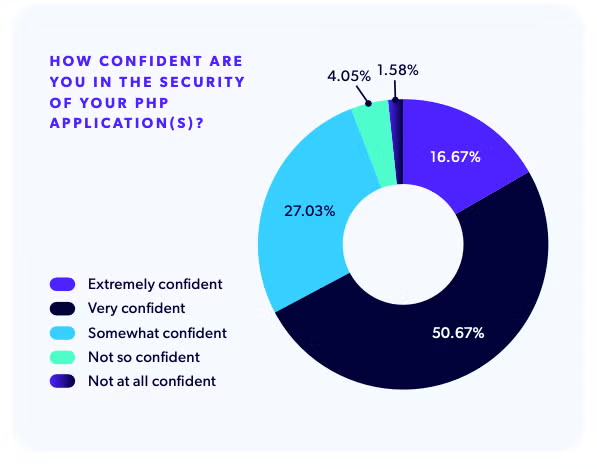
With nearly 70% of survey participants ranking their confidence level at "Very Confident" or "Extremely Confident," it is clear that PHP is generally regarded as a secure choice of coding language. However, we were curious how these results looked when segmented out by job role, and took a look at how Developers vs. C-Suite view their PHP security.
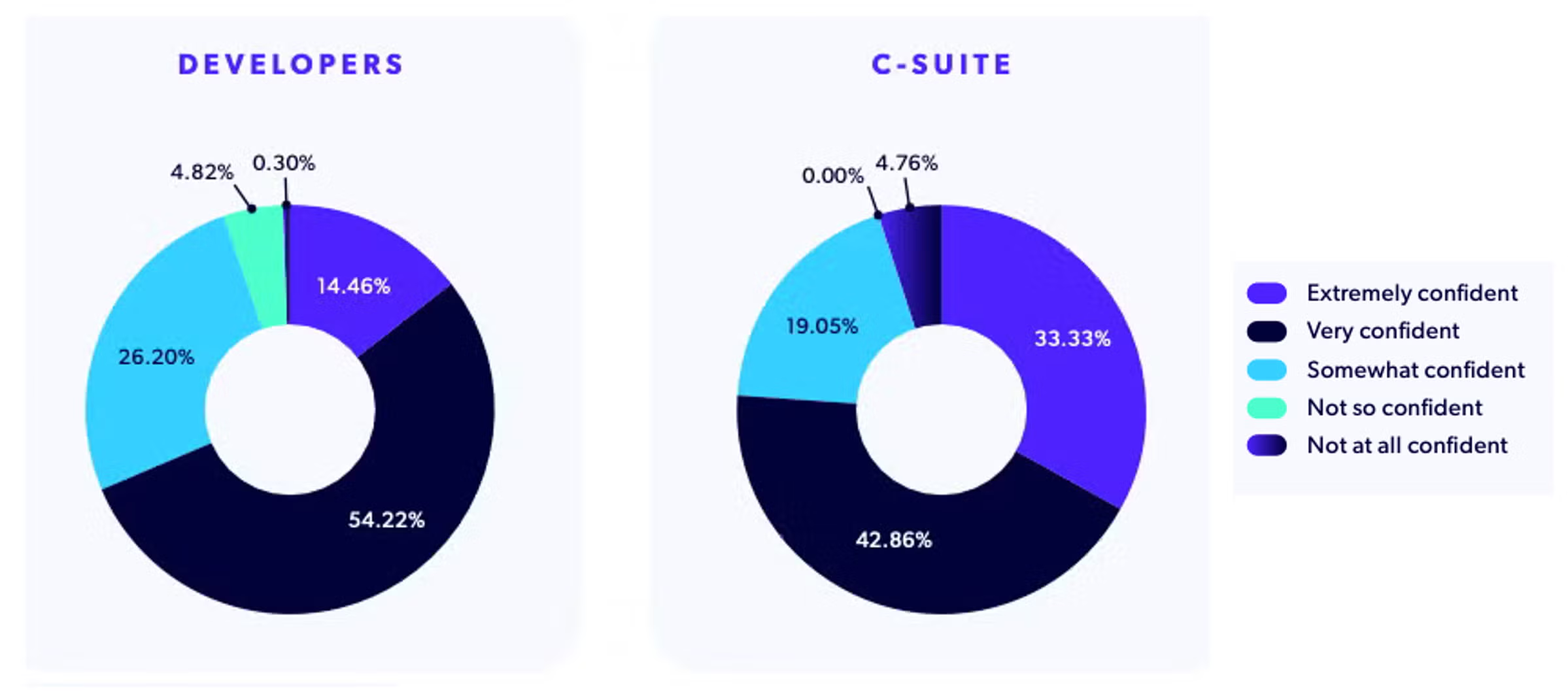
In general, we found that C-suite roles were much more confident in their PHP security compared to their developer counterparts, with 33.33% reporting feeling "Extremely Confident" in their PHP security. This was compared to 14.46% of developers.
To better understand our accumulated data, we then segmented by EOL usage, comparing teams deploying EOL PHP vs. those using community-supported versions.
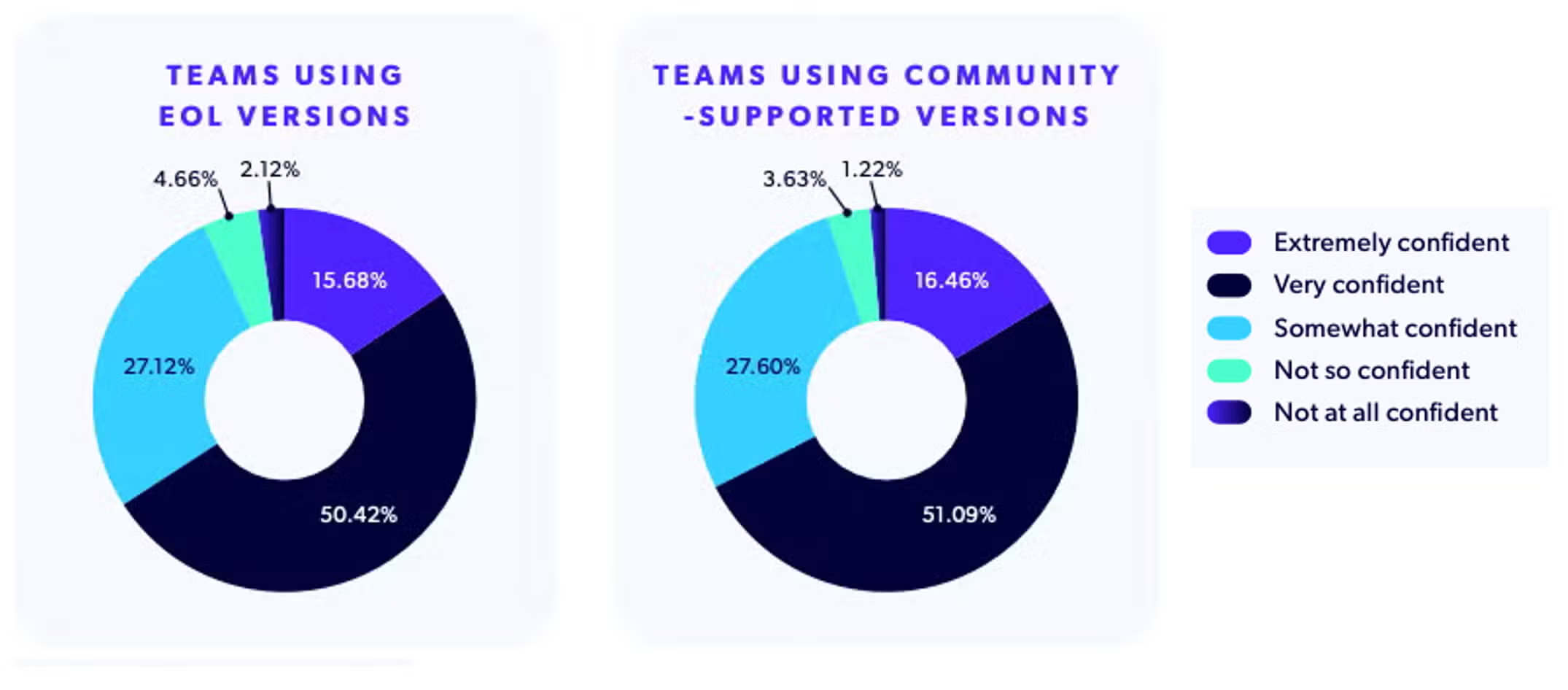
Interestingly, teams using EOL PHP versions had very similar confidence levels to teams using PHP versions still supported by the community. Where 67.55% of teams deploying PHP 8.1, 8.2, or 8.3 (the most current version at the time of the survey) reported feeling "Very Confident" or "Extremely Confident" in their PHP security, 66.10% of teams deploying EOL PHP reported the same.
Key Takeaways
PHP's security posture has evolved tremendously over the decades, giving its users greater confidence in the language. However, we've also seen a number of high-profile CVEs in the past few years, including parameter injection vulnerabilities in the CGI binary, remote code execution vectors when spawning external programs on Windows, and XML External Entity vulnerabilities that can lead to information disclosure.
As such, seeing high confidence in PHP security from teams using EOL PHP feels misplaced; the only mitigations are to update to a supported PHP version or to use a commercial LTS version. Regardless, PHP is earning a solid reputation as a secure language, particularly when teams keep on top of language updates.
Stay Secure With Support From Zend
Stay secure, compliant, and supported with expert PHP migration and upgrade support from Perforce Zend. Click the buttons below to learn more.
Back to top
Tactical Security Trends
Next, we asked teams to rate which security measures were the most important in the development and maintenance of their PHP applications. Respondents were asked to rate each option on a scale of 1 - 5, with 1 indicating that the tactic is not important, and 5 indicating the tactic is very important. We then compiled and ranked each security tactic according to its weighted average.
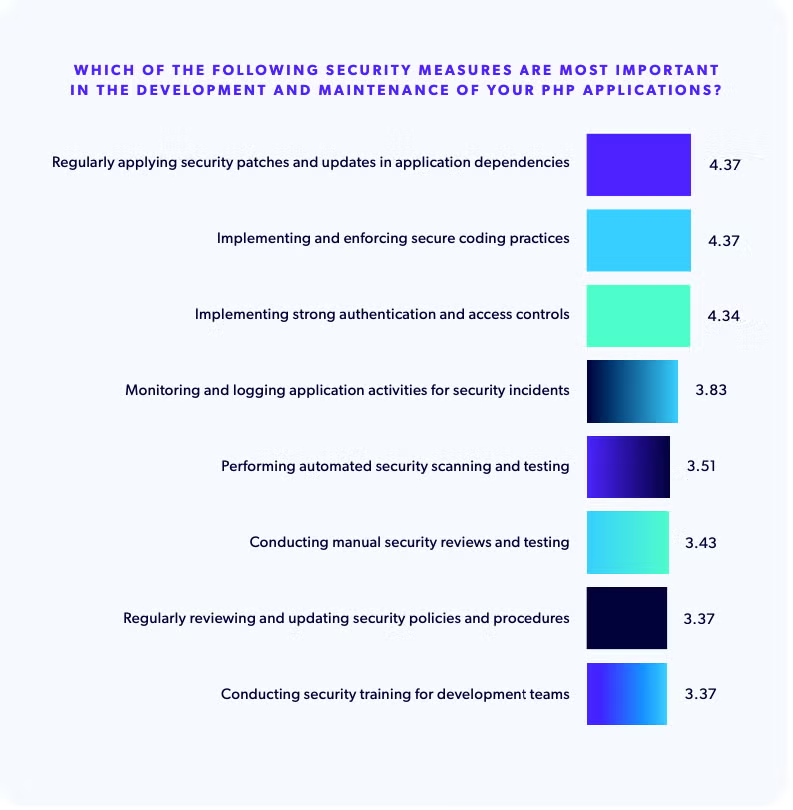
We found that the top tactic was a tie between "Regularly Applying Security Patches and Updates in Application Dependencies" and "Enforcing Secure Coding Practices," each with a weighted average of 4.37. These tactics were followed closely by "Implementing Strong Authentication and Access Controls," with a weighted average of 4.34.
Segmenting our findings by PHP version, we found that teams deploying EOL PHP were more likely to give greater importance to "Implementing and Enforcing Secure Coding Practices" over "Regularly Applying Security Patches and Updates in Application Dependencies."
Additionally, teams using EOL PHP in their applications were less likely to give importance to "Regularly Reviewing and Updating Security Policies" compared to those using community-supported versions, with respective weighted averages of 3.28 vs. 3.41.
Back to topTake Mission-Critical Apps From At Risk to Locked Down
Join our expert for an on-demand webinar delving into the most common vulnerabilities in PHP, providing practical knowledge to keep your apps secure against evolving security threats.
PHP Compliance Trends
In our next section, we asked participants if their PHP applications had any regulatory or industry compliance requirements. 54.11% said yes, 4.33% do not currently but will within the next 12 months, and 41.56% said no and did not have a forecast for them.
Comparing our results to our 2024 report, a similar number of teams have regulatory or industry requirements. However, there has been an increase in teams who do not have nor forecast any compliance requirements compared to last year (45.89% vs. 38.37%). A smaller percentage of teams (4.33% vs. 7.17%) likewise do not currently have compliance requirements but anticipate them in the next 12 months.
Looking at compliance requirements by company size, we found that companies with over 100 employees were more likely to have regulatory or compliance standards compared to companies with 100 employees or fewer (64.93% vs. 49.70%).
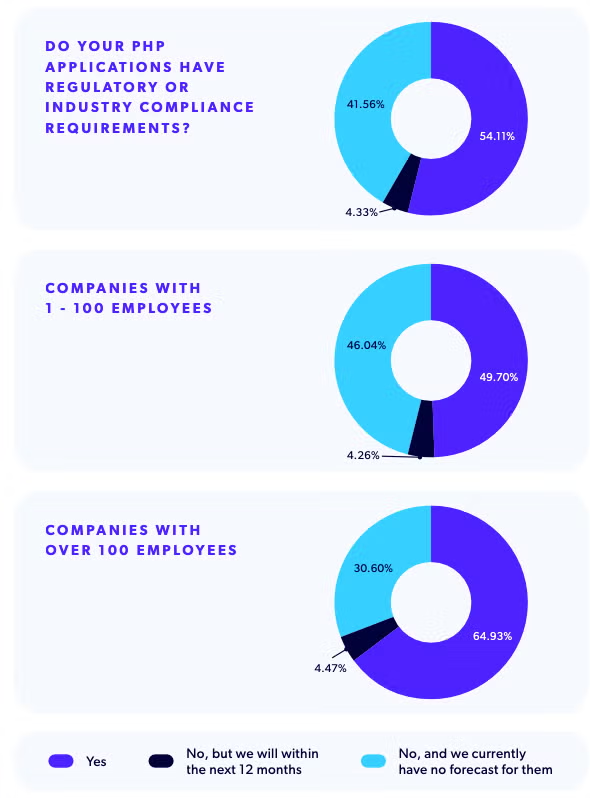
PHP Compliance Standards in 2025
Next, we asked teams who answered that they needed to meet compliance requirements to share which standards their PHP applications must meet, including the option to select multiple answers as needed.
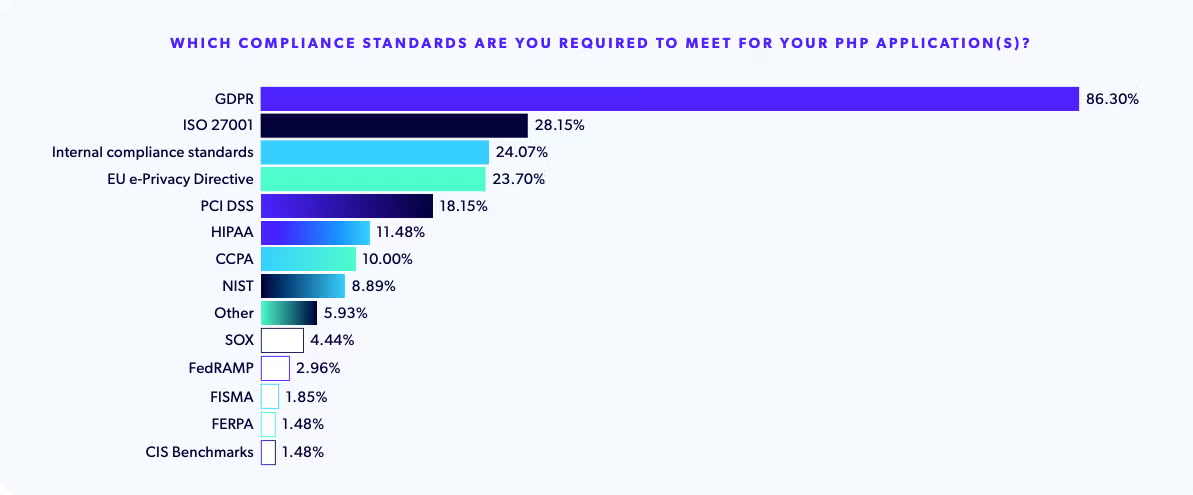
GDPR was the clear frontrunner with 86.30% of respondents. It was followed by ISO 27001 (28.15%), internal compliance standards (24.07%), EU e-Privacy Directive (23.70%), PCI DSS (18.15%), and HIPAA (11.48%). All other compliance regulations impacted 10% or less of participants, respectively.
We saw some interesting movement compared to our 2024 findings. The need to be compliant with GDPR standards rose 16.62% compared to last year. Additionally, we found that internal compliance standards have become more common, rising from 19.68% of teams to 24.07%. The EU e-Privacy Directive likewise has become more prevalent in the ecosystem, with 23.70% of participants requiring compliance compared to 2024's 16.13%.
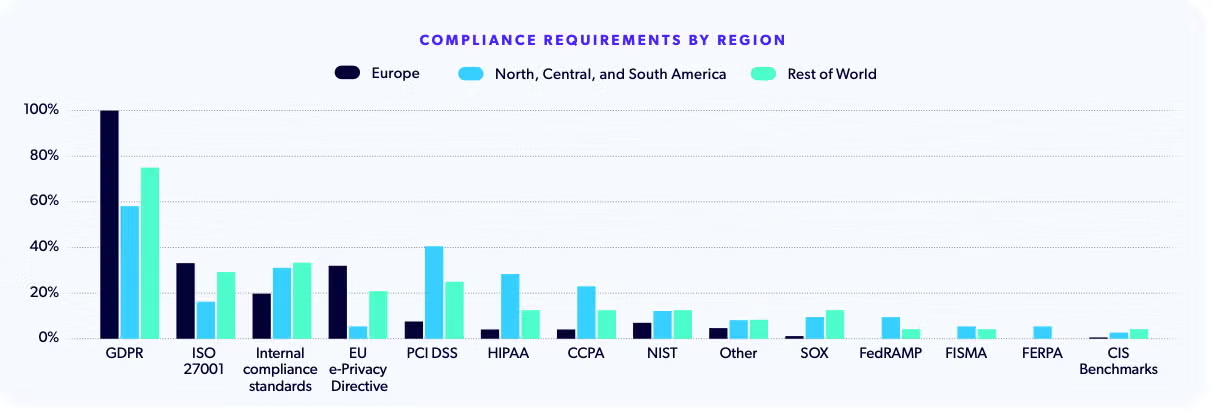
Looking at compliance requirements by region, we were not surprised to find that 100% of our European participants were required to meet GDPR standards. GDPR's prevalence was echoed elsewhere, with 58.11% of participants in North, South, and Central America and 75% of participants throughout Asia, Middle East, Africa, and Australia/New Zealand.
Key Takeaways
PHP is an increasingly global language, and most developer teams find themselves working with a progressively more complex network of compliance requirements. Government-mandated compliance standards (such as GDPR, ISO 27001, and EU e-Privacy Directive) still set the curve. However, due to the growing amount of internal compliance standards, we can surmise that companies are taking matters into their own hands by creating internal standards that match their exact regulatory needs and business goals.
Compliance with regulations and standards is never optional. Teams should proactively work to meet all necessary requirements and maintain compliance within their PHP applications, particularly when those applications handle sensitive customer data.
Back to topFinal Thoughts
The 2025 PHP Landscape Report highlights the importance of security and compliance in the PHP ecosystem. From changing confidence levels in PHP security to new compliance standards, teams must proactively work to keep their applications secure and compliant against new security threats.
Perforce Zend is here to help. We'll keep you informed on upcoming trends in the PHP landscape and work to enable your mission-critical PHP through our security services and solutions.
Are Your PHP Applications Secure?
Keep your mission-critical PHP secure, supported, and compliant with ZendPHP runtimes and the ZendHQ extension. Upgrade on your schedule, access 24/7/365 support, and access expert security solutions.
Additional Resources
- On-Demand Webinar - Tackling Prevalent PHP Vulnerabilities at Scale
- On-Demand Webinar - Optimizing PHP Apps
- 101 Guide - PHP Security
- Blog - PHP Observability and Monitoring Trends
- Blog - PHP Vulnerabilities: Assessment, Prevention, and Mitigation
- Blog - GDPR PHP Compliance: Maintaining GDPR for Web Applications
- Blog - Fintech PHP Applications: How PHP Supports the Finance Sector
